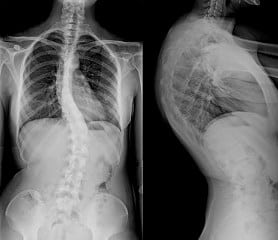Is it difficult to maintain an even posture? Do you experience pain when trying to stand up straight? A hunched back is a common symptom of a condition referred to as kyphosis, which is responsible for distorting your spine and causing it to curve outward. Patients who experience kyphosis suffer from constant pain, numbness, and tingling that radiates down through their legs. While kyphosis may be fairly minor in some cases, it others, it can be painful and lead to a number of issues, including difficulty breathing.

Kyphosis primary affects those who are unable to maintain appropriate posture, although there are genetic implications associated with this condition as well. Regardless of the cause, our Atlanta Orthopedic Doctors serve as a safe, viable resource that prevents you from having to consider invasive procedures. If you are currently suffering from kyphosis, contact AICA Orthopedics today for treatment.
How Orthopedic Doctors Diagnose Kyphosis
If you experience any tightness, sensitivity, or pain in your spinal joints – you may have kyphosis and should seek an experienced medical opinion. When you visit AICA Orthopedics for treatment, your Orthopedic Doctor will review your medical history with you before examining your back. They may possibly use an imaging device to help them understand more about your condition, too.
There are three types of kyphosis, all of which affect the curvature of the spine. In most cases, these conditions come on during childhood or adolescence. The first is known as postural kyphosis. It’s the most common of the three and usually occurs due to poor posture. It affects girls more often than boys, and it’s generally not painful. Normally, it can be treated by correcting posture and rarely causes problems later in life.
[ctaforBlog]
The second type of kyphosis is called Scheuermann’s kyphosis. This condition is named after the radiologist who first noted it. It’s also often diagnosed during adolescent years. Unlike postural kyphosis, however, it can be more severe, especially in those who are fairly thin. Scheuermann’s kyphosis is not caused by posture. Instead, it occurs when the spine has a structural abnormality to it. This can clearly be seen in X-rays due to how the vertebrae of the back are wedged together in a triangle shape. It’s often hard for people with this type of kyphosis to stand up straight. It can also be painful and often requires surgery to correct.
The final type of kyphosis is congenital kyphosis. This type of kyphosis can be diagnosed at birth and is caused by a lack of spinal development in utero. The bones of the spine do not form correctly. Congenital kyphosis generally becomes worse with age and usually requires surgery to correct it. Many times, congenital kyphosis is also accompanied by other birth defects.
Atlanta Orthopedic Treatment for Kyphosis
Depending on the results of your examination, you may require a series of ongoing adjustments to treat your condition while also restoring motion to the joints that exist in your spine. Spinal manipulation or adjustments will help loosen restricted areas of your spine, pushing particular parts of your spine back to their natural positions. The number of adjustments required depends on how severe the curvature is.
Techniques like Flexion-distraction use comfortable, non-thrusting motions that help restore movement and stimulate blood flow to reduce inflammation. Instrument-assisted manipulation relies on a handheld device that also helps address misalignments and restores joint motion. Some specific physical therapy exercises may also need to be done regularly to help strengthen the muscles that hold up the spine or to repair problems in other parts of the body caused by kyphosis.
[ctaforBlog]
Younger patients may need to wear special braces. These braces are generally used with Scheuermann’s kyphosis and help adjust how the spine develops. The amount of time a patient needs to wear the brace usually depends on age and how badly their spine is curved. Young children may not need to wear the brace as often because their bones are still flexible and are still growing, while older teens may find that they need to use the brace more often to help move their larger and more set bones into proper alignment.
Surgery is usually only needed in those with congenital kyphosis or with very severe other types of kyphosis. However, there are some times when a spinal fusion or other procedure is needed to prevent the condition for worsening or alleviate severe pain.
The Long-Term Benefits of Orthopedic Treatment for Kyphosis Patients
Patients who visit our Atlanta Orthopedic Clinic for Kyphosis often experience:
-
- No inflammation
- Less pain
- Fewer muscle spasms
- Improved posture
- Strength restoration
- More flexibility
Orthopedic treatment allows patients to avoid surgery, which often results in less pain and no time spent recovering.
Visit AICA Orthopedics for Kyphosis Relief

If you currently suffer from kyphosis, contact our Orthopedic Doctors today to schedule an appointment. There is no reason to live in pain or simply accept the fact that you have a condition that affects your posture and appearance. If you are interested in learning more about Orthopedic Treatment, our approach to treating kyphosis, or what your treatment options are, contact us today at (404) 855-2141.





